
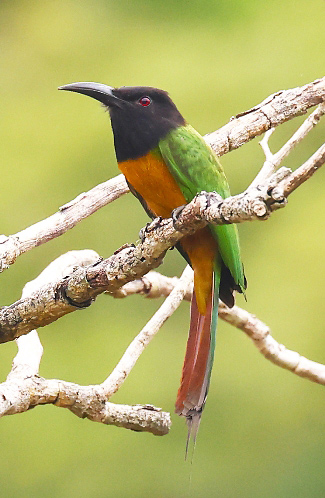
A rare and fine image of a Black-headed Bee-eater in Loango by Paul Noakes.
São Tomé and Príncipe
- Some of Africa's and the world's most spectacular localized birds including Long-tailed Hawk, Grey-necked Rockfowl, Vermiculated Fishing-owl, Black-headed and Rosy Bee-eaters, and African River Martin
- A few of Africa's and the world's other most spectacular birds including African Fish-eagle, Goliath Heron, Hamerkop, Grey Parrot, Pel's Fishing-owl and Great Blue Turaco
- Several monkeys including Black Colobus and Red-capped Mangabey, and a chance of Mandrill
- And other mammals including African (Forest) Elephant, African (Forest) Buffalo and Red River Hog
- With a chance of Gorilla, Chimpanzee and Mandrill
- All in what is one of the most politically stable, sparsely populated and therefore pristine countries in Africa and the world with over 10% of its land in 'protected' areas and 70% still covered by rainforest, the richest lowland forests for birds in Africa and home to high numbers of mammals
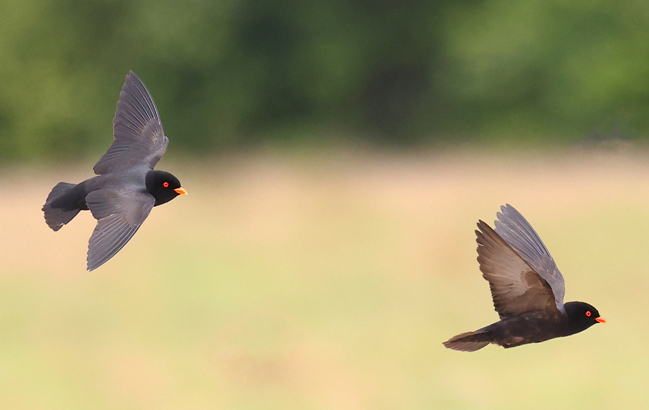
African River Martins at a colony in Loango by Paul Noakes.
- Gabon is not like East or South African destinations in that there is not much savanna and hence far fewer of the classic African plains mammals and birds and those not likely to be seen here include Lion, Cheetah, Giraffe, Spotted Hyaena, Burchell's Zebra, Ostrich, Secretary Bird, Kori Bustard and Lilac-breasted Roller.
- Gabon is the gateway to the two small islands of São Tomé and Príncipe in the Gulf of Guinea and these are often included in, or offered as an extension to, organized tours to the country, because they support 28 endemic bird species and it is possible to see all of them during a short visit, although some are very rare. The hardest to see on São Tomé are Dwarf (Olive) Ibis, São Tomé Short-tail and, especially, Newton's Fiscal and São Tomé Grosbeak. All four are most likely to be seen on a camping trip with local guides to the best remaining forest on Monte Carmo/Carvo in the remote south of the island. Most of the Príncipe endemics can be seen around the luxurious Bom Bom Island Resort which caters mainly for scuba diving and Marlin fishing. The tricky ones to see are the white-eye and thrush and it is necessary to travel by boat to the south of the island to look for these. Other species present on Príncipe include the dryas race of Blue-breasted Kingfisher and African Grey Parrot, both of which are still relatively 'common', as well as a possible new species of scops-owl. Boat trips can be arranged to look for seabirds on offshore islets and volcanic plugs, including White-tailed Tropicbird and Brown Noddy. The best time to visit the islands for birds is July-August. The best time for Green and Leatherback Turtles nesting on the beaches is December to March.
São Tomé and Príncipe Endemics 28 São Tomé 18 São Tomé (Maroon) Olive-pigeon, São Tomé Green-pigeon, Dwarf Ibis, São Tomé Scops-owl, São Tomé (Malachite) Kingfisher, São Tomé Oriole, São Tomé Paradise-flycatcher, Newton’s Fiscal, São Tomé Prinia, São Tomé White-eye, Black-capped Speirops, São Tomé Thrush, Newton’s Sunbird, Giant Sunbird, Giant Weaver, São Tomé Weaver, São Tomé Short-tail (wagtail family) and São Tomé Grosbeak.
Príncipe 8 Príncipe (Malachite) Kingfisher, Dohrn’s Warbler (Thrush-babbler), Príncipe White-eye, Príncipe Speirops, Príncipe Starling, Príncipe Thrush, Príncipe Sunbird and Príncipe Golden Weaver.
São Tomé and Príncipe 2 São Tomé Spinetail and Príncipe Seedeater.
(Some taxonomists believe the island forms of Lemon Dove, Chestnut-winged Starling and São Tomé White-eye (which otherwise occurs only as another race on Principe) are also endemic. Golden-backed Bishop, which occurs on São Tomé and otherwise only in Angola has possibly been introduced to São Tomé).
Near-endemics
São Tomé, Príncipe and Annobon 1 São Tomé (Bronze-naped) Pigeon.
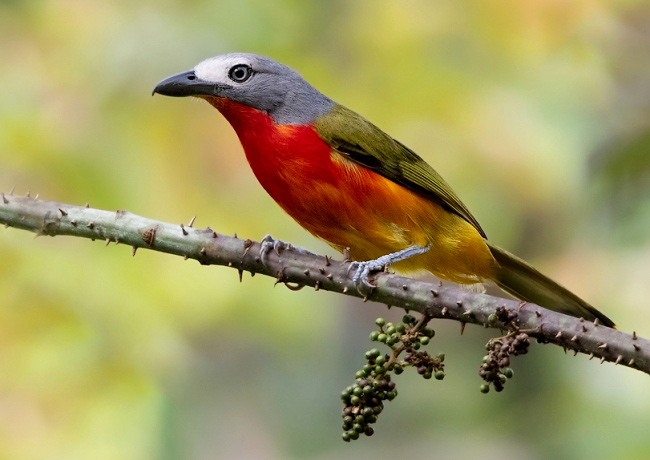
A striking image of a striking but elusive bird, a Fiery-breasted Bushshrike, by Dubi Shapiro.
Best Birds and other wildlife in Gabon
Birds
Endemics 1 Olive-backed Forest-robin (likely to occur in adjacent Congo).
Near-endemics
Gabon, Equatorial Guinea, Cameroon and Nigeria 2 Forest Swallow and Rachel’s Malimbe.
Gabon, Cameroon and Centra African Republic (CAR) 1 Dja River Swamp-warbler.
Gabon, RC and DRC 1 Loango Weaver.
Gabon, RC and Angola 1 Black-chinned Weaver.
Gabon, CAR, RC, DRC and Angola 1 African River Martin (at coastal nesting colonies mostly Oct-Nov).
Other specialities
Black and Plumed Guineafowl, Finsch’s and Forest (Latham’s) Francolins, Hartlaub's Duck, Spot-breasted Ibis, Congo Serpent-eagle, African Finfoot,
Black-rumped Buttonquail, Grey Pratincole, Forbes's Plover, Yellow-throated Cuckoo, Fraser’s Eagle-owl, Pel’s and Vermiculated Fishing-owls, Red-chested
Owlet, Bates’s and Brown Nightjars, Black Spinetail, Bates’s Swift, Bare-cheeked Trogon, Chocolate-backed and White-bellied Kingfishers, Black-headed and
Rosy Bee-eaters, Blue-throated Roller, Lyre-tailed Honeyguide, Rufous-sided Broadbill, Blue Cuckooshrike, Angola and Verreaux's Batises, White-spotted and
Yellow-bellied Wattle-eyes, Rufous-bellied Helmetshrike, Fiery-breasted Bushshrike, Lowland Sooty Boubou, Souza’s Shrike, Bates’s Paradise-flycatcher,
Grey-necked Rockfowl (Red-headed Picathartes), Yellow-throated Nicator, Sjöstedt’s Greenbul, Black-collared Bulbul, Red-throated Swallow, Gosling's Apalis,
Salvadori’s Eremomela, Congo Moor-chat, Violet-tailed Sunbird, Yellow-capped Weaver, Red-bellied Malimbe, Red-headed (Woodhouse’s) Antpecker, Short-tailed
Pipit and Black-faced Canary. (Damara Tern occurs mainly Apr-Jan, especially May- Oct). Rarely seen forest species include White-crested Tiger-heron,
Grey-throated Rail, Sandy Scops-owl, Maned Owl, Shelley’s Eagle-owl, Blue-headed Bee-eater, Eastern Wattled Cuckooshrike, Tessmann’s Flycatcher,
Grey Ground-thrush and Red-crowned Malimbe.
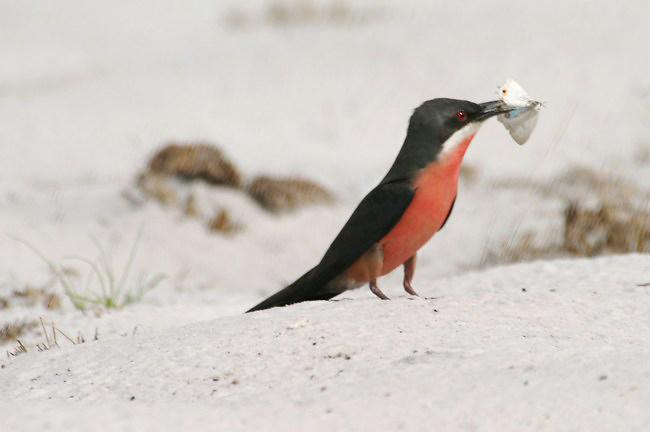
A Rosy Bee-eater at a colony in Loango by Simon Colenutt.
Others
Pink-backed Pelican, Goliath Heron, White-backed Night-heron, Hamerkop, Olive Ibis, African Darter, African Fish and African Crowned Eagles, Bat Hawk,
Long-tailed Hawk, White-bellied (Barrow's) Bustard, White-headed Lapwing, African Jacana, Rock Pratincole, Temminck's Courser, African Skimmer, Blue-headed
Wood-dove, Grey Parrot, Thick-billed Cuckoo, Olive Long-tailed Cuckoo, turacos, Cassin's and Sabine's Spinetails, Narina Trogon, kingfishers including
Blue-breasted and Giant, bee-eaters including Black and Blue-breasted, hornbills including Black-casqued and White-crested, barbets, Vanga (Black-and-white
Shrike) Flycatcher, Chestnut Wattle-eye, Gorgeous (Four-coloured/Perrin's) Bushshrike, White-throated Blue Swallow, Yellow-billed Oxpecker, sunbirds,
weavers, malimbes and waxbills.
Mammals
(Western Lowland) Gorilla, African (Forest) Elephant, Hippopotamus (including
some which swim in the sea), African (Forest) Buffalo, Red River Hog, Humpback Whale (mostly Jul-Sep), Black Colobus,
Crowned and Moustached Guenons, Grey-cheeked and Red-capped Mangabeys, (Greater) Putty-nosed Monkey, Sitatunga, Water
Chevrotain, Bay, Blue, Ogilby’s, Peters’ and Yellow-backed Duikers, Beecroft’s and Lord Derby’s Anomalures, Long-eared
Flying Mouse, African Palm Civet, bats including Hammer(-headed Fruit), Milne-Edwards’s Potto, and Demidoff’s and
Thomas’s Galagos. Also a chance of Chimpanzee, Mandrill (a good chance at Mikongo, Lope NP, if visitors go out with
scientists radio-tracking a troop of 1000+ animals), Northern Talapoin, Sun-tailed Monkey, Bongo, Killer and Sperm
Whales (both mostly Jul-Sep), Atlantic Humpback Dolphin, Leopard, Golden Cat, Giant and White-bellied Pangolins
(remote possibilities at Mikongo, Lope NP where pangolin poachers are known to lay out nets a kilometre or more long),
Congo Clawless Otter and West African Manatee.
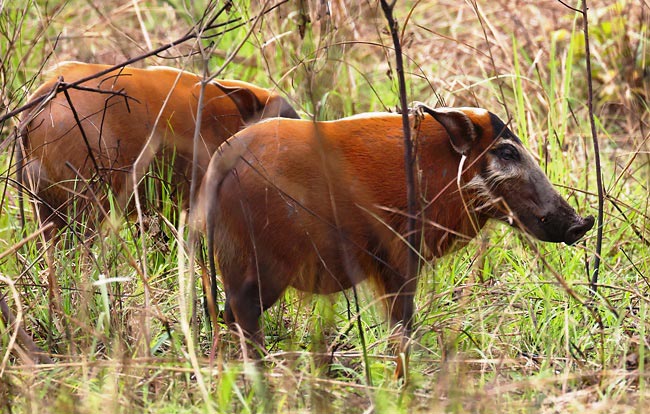
Red River Hogs in Loango by Paul Noakes.
Reptiles, Amphibians and Fish
Leatherback Turtle (mostly Nov-Apr) and Tarpon. Also a
chance of Dwarf, Central African Long- (Slender-) snouted and Nile Crocodiles.
Best Sites for Birds and other wildlife in Gabon
- Nyonie Lodge, near Libreville Black-headed Bee-eater and Chestnut-bellied Helmetshrike. Also a chance of Atlantic Humpback Dolphin.
- Akanda NP, near Libreville A chance of West African Manatee.
- Nende Island, near Akanda A chance Northern Talapoin.
- Loango NP Hippopotamus (including some which swim in the sea), Humpback Whale, Red-capped Mangabey (Akaka Camp), Leatherback Turtle, Tarpon, Long-tailed Hawk, African Finfoot, Damara Tern, African Skimmer, Pel's and Vermiculated Fishing-owls, Black-headed and Rosy Bee-eaters, African River Martin (mostly Oct-Nov), White-throated Blue Swallow, Violet-tailed Sunbird and Loango Weaver (Akaka Camp). Also a chance of Gorilla, Chimpanzee, Giant Pangolin, Dwarf, Long-snouted and Nile Crocodiles, and White-crested Tiger-heron, Forbes's Plover and Senegal Lapwing, and an outside chance of West African Manatee.
- Tsam Tsam Camp/Lodge at the edge of the Oguemoue Lake in the Gabon Lakes region, reached by boat along the Ogooue River from Lambarene (two hours by road from Ndjole, five hours by road from Libreville). Hartlaub’s Duck, African Finfoot, Pel’s and Vermiculated Fishing-owls, Black, Cassin’s and Sabine’s Spinetails, Shining-blue and White-bellied Kingfishers, Black Bee-eater, Brown-eared and Buff-spotted Woodpeckers, White-browed Forest-flycatcher, Carmelite and Fraser’s Sunbirds, Icterine Greenbul, Cassin’s Malimbe, Red-capped Mangabey, Water Chevrotain and Central African Slender-snouted Crocodile. Also an outside chance of White-crested Tiger-heron, Giant Pangolin and West African Manatee.
- Ndjole, on the Ogooue River Grey and Rock Pratincoles.
- Lope NP Red-headed Picathartes (Mikongo), Dja River Swamp-warbler, Red-bellied Malimbe, Black Colobus Monkey, Water Chevrotain, Beecroft’s and Lord Derby’s Anomalures, Demidoff’s Galago and Milne-Edward’s Potto. Also a chance of Black Guineafowl, Gorilla (tracking in operation from Mikongo), Chimpanzee, Mandrill, Bay, Blue, Ogilby’s and Yellow-backed Duikers, Long-eared Flying Mouse, Hammer Bat and Dwarf Crocodile, and an outside chance of Giant and White-bellied Pangolins, Golden Cat and Sun-tailed Monkey.
- Northern Ivindo NP - Ipassa-Makokou Research Station Area near Makokou 190 Guinea-Congo Forest biome-restricted species, Bare-cheeked Trogon, Yellow-bellied Wattle-eye, African River Martin (mostly Dec-Mar and Jun-Sep), White-throated Blue Swallow, Rachel's Malimbe and Red-headed (Woodhouse's) Antpecker. Also a chance of Black and Plumed Guineafowls, Olive and Spot-breasted Ibises, White-spotted Flufftail, Yellow-throated Cuckoo and Blue-headed Bee-eater.
- Southern Ivindo NP - Ivindo/Langoue Bai Area Gorilla, Sitatunga, Buffalo, Moustached Guenon, Putty-nosed Monkey, Blue and Peters's Duikers, Long-tailed Hawk, Dja River Swamp-warbler, and Blue-billed and Rachel's Malimbes. Also a chance of Chimpanzee, Golden Cat, Bongo, Congo Clawless Otter, Black Guineafowl, Spot-breasted Ibis, Yellow-throated Cuckoo and Rufous-sided Broadbill.
- Bateke Plateau/Lekoni Area Finsch’s Francolin, Black-rumped Buttonquail, Black-headed Bee-eater, Temminck's Courser, Angola Batis, Gorgeous Bushshrike, Congo Moor-chat, Black-collared Bulbul, Dambo Cisticola, Short-tailed Pipit, Black-chinned Weaver and Marsh Widowbird. Also a chance of Pennant-winged Nightjar, Fiery-breasted Bushshrike and Locust Finch.
- Lekedi Park, near Bakoumba Wild and introduced Mandrills (fed by rangers in a fenced private park), Grey-cheeked Mangabey, Moustached Guenon and Sitatunga.
- Mayumba NP Hippopotamus and Leatherback Turtle.
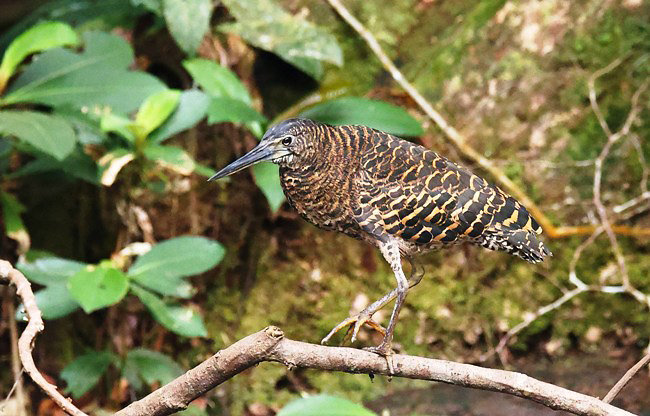
White-crested Tiger-heron in Loango by Paul Noakes.
Best Times for Birds and other wildlife in Gabon
The best time to visit for birds is October-November when flocks of Rosy Bee-eaters and African River Martins are usually at their large and impressive coastal nesting colonies where tens to hundreds of thousands arrive in August or September to breed. When the main rains arrive normally in February both species disperse inland with the martins migrating through places such as the Makokou Area in Northern Ivindo NP before spending the non-breeding season in the remote and largely inaccessible areas of the Congo Basin. July-August is the driest time of the year but bird activity can be low during this period. Large mammals and Leatherback Turtles visit the beaches of places such as Loango NP during the wet season, which usually lasts from October to May although it is often dry in December-January. The best time to look for Mandrills is July to October, especially early September when lone males are seeking out females in oestrous. The big troops usually split up in November, the animals disperse widely and become very difficult to find.
Recommended Bird Books etc. for Gabon, São Tomé and Príncipe
Birds of Western Africa by N Borrow and R Demey. Helm, 2014 (Second Edition (paperback)).
Birds of Western Africa by N Borrow and R Demey. Helm, 2002 (First Edition (hardback)).
Birds of Africa south of the Sahara by I Sinclair and P Ryan. C Struik, 2011 (Second Edition).
The Kingdon Field Guide to African Mammals by J Kingdon. Bloomsbury, 2015 (Second Revised Edition).
The Kingdon Pocket Guide to African Mammals by J Kingdon. Bloomsbury, 2016 (Second Edition).
Apps etc.
The Kingdon Guide to African Mammals.
Where to watch birds in Africa by N Wheatley. Helm, 1995.
Don’t know which country/countries to visit in Africa? Then it may be worth considering taking a look at this book, written by this website’s author. It is many years old of course but it still provides a starting point, an overview and a guiding light to the best birds and the best places to look for them on the continent, and could save hours of searching for similar information on the internet. However, it is important to check more up-to-date sources for sites which have been opened up, sites and species which have been discovered, lodges that have been built etc. since the book was published.
Birding and Wildlife Trip Reports for Gabon, São Tomé and Príncipe
Many trip reports, some for Gabon, are posted on the websites listed here. On some of these websites some reports are independent and some are posted by tour companies who organize tours to Gabon. These tour companies and others also post their own reports on their websites, which are listed under 'Some Organized Tours to Gabon' below.
- The best website for trip reports is CloudBirders
- but these are also worth a look
- Birdtours
- Fatbirder
- Jon Hornbuckle
- Mammal Watching
Local bird and wildlife guides in Gabon, São Tomé and Príncipe
The costs of organized tours partly reflect the quality of the tour leaders. Some leaders are certainly better than others and many companies claim their leaders are the best but even the best rely at least to some extent on the exceptional skills of the local guides they employ. If you are travelling independently, employing such local guides will greatly increase your chances of seeing the wildlife you wish to see.
Accommodation for birders in Gabon, São Tomé and Príncipe
Some Organized Tours for birds and other wildlife to Gabon, São Tomé and Príncipe
There are many tour companies who organize tours to see mammals, birds, other wildlife and other natural wonders. The cost of these tours vary considerably according to such variables as the airlines used, the number of days the tours last, the number of sites visited, the number of people in the group (an important consideration if you wish to see such wildlife as rainforest mammals and birds), the number of tour leaders, the standard of accommodation and transport, and the percentage profit the company hopes to make. Generally, where the number of days tours last and the number of sites visited are similar, the cheapest tours are those that use the cheapest airlines, accommodation and local transport, that have the largest groups with the least number of leaders, and that make the least amount of profit. The most expensive tours tend to be those which are exceptionally long, use the most expensive accommodation (ridiculously lavish in some cases, even for single nights) and which make the most profit. Some tour costs partly reflect the quality of the tour leaders. Some leaders are certainly better than others and many companies claim their leaders are the best but even the best rely at least to some extent on the exceptional skills of the local guides they employ.
While tour companies organize tours with set itineraries many also organize custom tours for individuals and private groups who instead of taking a tour with a set itinerary want to follow their own itinerary to suit their own personal tastes, whether it be mammals, birds, other wildlife, other natural wonders or even man-made attractions, or a mixture of them all. Many organized tours with set itineraries are also fast-paced and target as many species as possible, whether they are mammals, birds or other wildlife or everything, which usually leaves little time to enjoy the best sites and individual species, but on a custom tour those taking part can specify the pace and the sites and species they wish to concentrate on. Custom tours also suit people who like to travel with people they already know, rather than with a group of strangers, and people with partners with different interests. Individuals and small groups will almost certainly have to pay more than the price of an organized tour with a set itinerary but a large group of friends may be able to travel for less than the price quoted for a set tour.
Tour companies who run organized tours or can arrange custom tours to Gabon include the following.
